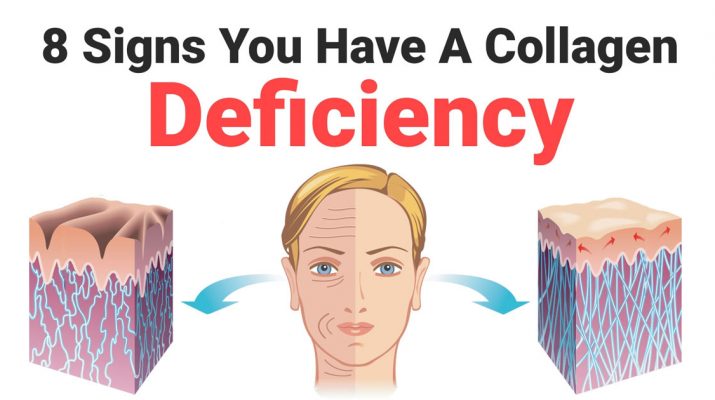What Is Collagen?
Collagen, the body’s main structural protein, makes up 25 to 35 percent of protein in humans and all other mammals. As a protein, collagen is made up of the amino acids arginine, glycine, hydroxyproline, and proline. The amino acids are comprised of the elements carbon, hydrogen, and oxygen.
Collagen is produced by fibroblasts, biological cells that help to form the structure of animal tissues. Fibroblasts, the most common type of connective tissue cells, also play a role in the healing of wounds.
Found primarily in connective tissue (e.g., skin), collagen is also present in fibrous tissues of ligaments, muscles, tendons. The tissues making up the blood vessels, bladder, digestive tract, heart, kidneys, and gallbladder contain collagen. The hair and nails are mostly collagen.
In total, there are five types of collagen:
- I: bone, organs, skin, tendon, vascular (type I makes up over 90% of the body’s total collagen.)
- II: cartilage (flexible tissue found in the larynx and parts of the respiratory tract, joints, and ear.)
- III: reticulate (‘reticular fibers’)
- IV: basal lamina (cellular entanglement which supports the epithelium, one of the four types of animal tissue.)
- V: cellular surfaces, hair follicles, and placenta
Here are some interesting facts about this protein:
- Some collagen fibrils (thin, elongated arrangements of collagen molecules) are stronger than steel.
- Because of factors such as age, smoking, and UV light exposure, collagen levels decline in the body.
- Collagen dressings, derived from bovine, equine, and porcine sources, can be placed onto wounds (e.g., burns, cuts, lesions, etc.) to assist with healing.
- Cosmetic products such as lotions that claim to boost collagen production are often misleading. Collagen molecules are difficult for the skin – and therefore the body – to absorb.
What Does Collagen Do?
The most important job of collagen is to act as a sort of “glue” holding the body together. Collagen in the skin, for example, gives it elasticity (“stretchiness”) to accommodate for changes to the internal or external environment. Besides giving skin its flexibility, collagen protects us by preventing the absorption of bacteria, pathogens, and toxins.
Most collagen is in the extracellular matrix, macromolecules that form the scaffold of cells. These matrixes are primary building and supporting blocks of tissue. The reasons for depletions of collagen in the body includes factors such as aging, post-menopause, smoking, and prolonged exposure to ultraviolet (UV) light.
There are two primary uses for collagen: cosmetic and medical. As our body can break down, convert, absorb, and re-absorb collagen, manufactured sources of collagen exist. Here are a few ways in which collagen is used:
Guided Tissue Regeneration:
As collagen barriers block the growth of gum tissue in the areas surrounding the tooth’s root, cells can successfully regenerate. In such cases, surgeons may use synthesized collagen membranes to expedite and improve treatment outcomes for conditions such as a gingival recession.
Skin Filling:
Injections of manufactured collagen may help enhance the natural contours of the skin by filling in areas of collagen depletion. Collagen injections reduce the appearance of lines and wrinkles, for example.
Wound Healing:
As mentioned, collagen can assist with the healing of wounds. Collagen dressings help to heal:
- Granulating or rotting wounds
- Necrosis (cell injury resulting in premature cellular death.)
- Second-degree burns
- Wounds that don’t respond to alternative treatments
- Wounds that excrete bodily fluids
Collagen Vascular Disease
Besides natural and lifestyle factors, certain diseases may cause collagen depletion and, hence, deficiency. Collagen vascular disease applies to a group of diseases known to cause damage to the connective tissue. Collagen vascular diseases may target the blood vessels, joints, skin, or other vital organs.
Collagen vascular diseases are categorized into autoimmune and hereditary diseases. Autoimmune collagen vascular diseases are those that damage the immune system, causing it to turn the body on itself.
Collagen Diseases Include:
Lupus:
The most common type of lupus, systematic lupus erythematosus (SLE), is a chronic disease that affects at least 1.5 million Americans. Symptoms of SLE include anemia, blood clot, headaches, joint pain and swelling, hair loss, severe fatigue, a rash of the cheek and nose (“butterfly rash”), and “Reynaud’s phenomenon” – the bluing and tingling of the fingers when exposed to cold temperatures.
Rheumatoid Arthritis (Ra):
RA is an autoimmune disease characterized by joint damage and joint pain occurring on both sides of the body. A chronic disease, the often erratic symptoms of RA include exacerbating issues known as “flares.” Other symptoms of RA include joint stiffness and loss of mobility.
Systematic Sclerosis (Ss):
SS, an autoimmune disease, occurs when the immune system attacks healthy body tissue. Symptoms of SS include changes to skin appearance and texture, constipation, diarrhea, hair loss, joint pain, dry cough, visible narrowing of blood vessels, and white lumps under the skin (calcium deposits).
Temporal Arteritis:
As the name implies, temporal arteritis (not “arthritis”) is a condition defined by changes – namely, damage and inflammation – to the arteries around the temples. Symptoms of temporal arteritis include double vision, fever, fatigue, hip pain and stiffness, loss of vision in one eye, jaw pain, loss of appetite, shoulder pain and stiffness, sudden weight loss, and severe headaches around the temples.
Signs Of Collagen Deficiency
Now that we’ve discussed what collagen is, it’s functions, and conditions that may cause collagen depletion, here are eight sights of collagen deficiency:
1. Hollowing Of Eyes And Face
When you look at a child, one thing that you may notice is the fullness of their face and smooth skin. Aging causes this natural, glowing look to fade. Aging, of course, if one of the primary causes of collagen loss.
As a result of collagen depletion, you may notice that the area under your eyes appears hollower and darker. Your cheeks may begin to thin.
2. Joint Pain
Cartilage, the buoyant, rubber-like tissue that covers the ends of long bones at the joints, is made up of a lot of collagen. Collagen loss in these areas results in more bone-on-bone movement, which can cause joint pain. Aside from causing discomfort around the joints, collagen depletion may inhibit motion – including the movement of the ligaments and tendons.
3. Leaky Gut
As mentioned, collagen can be found nearly everywhere in the body, including in the stomach. It wasn’t until recently that collagen was discovered as a key substance in the gut’s lining. Diminution of collagen in the gut may lead to intestinal permeability or “leaky gut syndrome.” Symptoms of leaky gut include constipation, diarrhea, brain fog, fatigue, nutrient deficiencies, and an impaired immune system.
4. Loss Of Mobility
Collagen vascular diseases, particularly lupus and RA, can cause a loss of movement due to joint damage or stiffness leading to a loss of mobility. People with these diseases experience a compromised immune response, producing inflammation within the collagen surrounding the joints.
5. Muscle Aches
Most of our body’s supply of collagen is in our connective tissue, which “connects” the ligaments and muscles to our skeletal system. As collagen depletes, these connections weaken, which can cause complications like muscle aches and pains.
6. Problems With Blood Flow
Collagen makes up the walls of blood vessels which, as collagen depletes, are less able to regulate blood flow. Interruptions to blood flow may produce symptoms such as chest pain, dizziness, fatigue, and frequent headaches.
7. Cellulite
Cellulite occurs when the layer of fat underneath the skin pushes up on the connective tissue, creating a dimpled or lumpy appearance. Loss of collagen causes the skin to lose some of its elasticity, which may contribute to the development of cellulite.
8. Wrinkling
Of all things that collagen does, spawning of skin lines and wrinkles tops the list – and for a good reason. Collagen is responsible for giving skin its structure. As such, when there’s less collagen, the skin isn’t quite as firm. When the skin loses elasticity and firmness, wrinkles often result.
Final Thoughts: Boost Your Collagen Levels
While there may be no way to halt collagen loss completely, there are things that you can do to support your body’s production of collagen. Here are a few tips:
#1 Control the controllable: Smoking and UV exposure are two big reasons for collagen loss. Limit your exposure to harmful UV rays (read: wear sunscreen!) and quit smoking, if applicable. These two choices can greatly improve your skin health.
#2 Use aloe vera: Besides treating and healing cuts and wounds, Aloe Vera works to increase collagen production when applied as a topical lotion or gel. Studies show that oral supplements may help boost collagen production as well.
#3 Take ginseng: The numerous health benefits of ginseng include anti-aging. Ginseng contains antioxidants that protect cells and promote skin health. While more research would help, ginseng may encourage the growth of collagen and reduce the damage caused by UVB rays.


